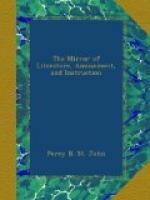Additions to human power.—The force necessary to move a stone along the roughly-chiselled floor of its quarry is nearly two-thirds of its weight; to move it along a wooden floor, three-fifths; by wood upon wood, five-ninths; if the wooden surfaces are soaped, one-sixth; if rollers are used on the floor of the quarry, it requires one-thirty-second part of the weight; if they roll on wood, one-fortieth; and if they roll between wood, one-fiftieth of its weight. At each increase of knowledge, as well as on the contrivance of every new tool, human labour becomes abridged.
Economy of time.—Several pounds of gunpowder may be purchased for a sum acquired by a few days’ labour; yet, when this is employed in blasting rocks, effects are produced which could not, even with the best tools, be accomplished by other means in less than many months.
Economy of Materials.—The worn-out saucepans and tin-ware of our kitchens, when beyond the reach of the tinker’s art, are not utterly worthless. We sometimes meet carts loaded with old tin kettles and worn-out iron coal-scuttles traversing our streets. These have not yet completed their useful course; the less corroded parts are cut into strips, punched with small holes, and varnished with a coarse black varnish for the use of the trunkmaker, who protects the edges and angles of his box with them; the remainder are conveyed to the manufacturing chemists in the outskirts of the town, who employ them, in conjunction with pyroligneous acid, in making a black dye for the use of calico printers.
Accumulation of Power arises from lifting a weight and then allowing it to fall. A man, even with a heavy hammer, might strike repeated blows upon the head of a pile without producing any effect. But if he raises a much heavier hammer to a much greater height, its fall, though far less frequently repeated, will produce the desired effect.
Regulating Power.—A contrivance for regulating the effect of machinery consists in a vane or a fly, of little weight, but presenting a large surface. This revolves rapidly, and soon acquires an uniform rate, which it cannot greatly exceed, because any addition to its velocity produces a much greater addition to the resistance it meets with from the air. The interval between the strokes on the bell of a clock is regulated by this means; and the fly is so contrived, that this interval may be altered by presenting the arms of it more or less obliquely to the direction in which they move. This kind of fly or vane is generally used in the smaller kinds of mechanism, and, unlike the heavy fly, it is a destroyer instead of a preserver of force. It is the regulator used in musical boxes, and in almost all mechanical toys.




